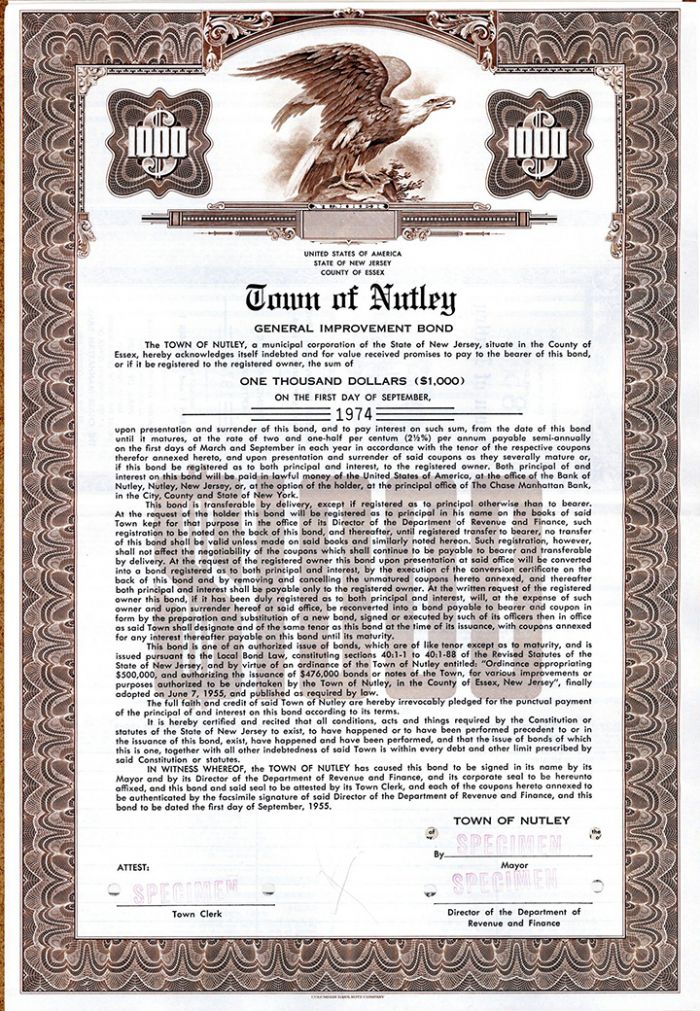Town of Nutley, New Jersey - $1,000 Specimen Bond
Inv# SE3263 Specimen Bond
$1,000 2 1/2% Specimen Bond printed by Columbian Bank Note Company. Almost 2 full pages of coupons remain.
Nutley is a township in Essex County, New Jersey, United States. As of the 2020 United States census, the township's population was 28,434.
What is now Nutley was originally incorporated as Franklin Township by an act of the New Jersey Legislature on February 18, 1874, from portions of Belleville Township. Nutley was incorporated as a town on March 5, 1902, replacing Franklin Township. In 1981, the town was one of seven Essex County municipalities to pass a referendum to become a township, joining four municipalities that had already made the change, of what would ultimately be more than a dozen Essex County municipalities to reclassify themselves as townships in order take advantage of federal revenue sharing policies that allocated townships a greater share of government aid to municipalities on a per capita basis.
Nutley derived its name from the estate of the Satterthwaite family, established in 1844, which stretched along the Passaic River and from an artist's colony in the area.
New Jersey Monthly magazine ranked Nutley as its 38th best place to live in its 2008 rankings of the "Best Places To Live" in New Jersey.
Nutley grew slowly as Newark developed. The first European settler in the area, recorded in the minutes of a Newark town meeting in 1693, was a Dutch painter named Bastian Van Giesen. His house, known as Vreeland Homestead, still stands today on Chestnut Street and is the location of the Nutley Women's Club. John Treat and Thomas Stagg purchased lots adjacent to Van Geisen's in 1695 and 1698 respectively. The Van Riper House is another building from the era.
The first brownstone quarry in Nutley is believed to have been in operation by the early 18th century and was the town's first major industry. Jobs at the brownstone quarry in the Avondale section of Nutley provided work for many Italian and Irish immigrants. Mills situated along the Third River in the area now known as Memorial Park I became Nutley's second major industry.
John and Thomas Speer, Joseph Kingsland, and Henry Duncan all operated mills in the town during the 1800s. Current streets in Nutley are named after these mill owners. Henry Duncan built several mills throughout the town and established the village of Franklinville consisting of 30 homes and a few small businesses which later became the center of Nutley. One of Duncan's buildings has been modified and now serves as the town hall. Kingsland Manor is a national historic place.
During the late 1880s, painter Frank Fowler founded an artists' colony on The Enclosure, a dead-end street that is near the Third River, a stream that runs through the town's parks. Later artist residents of the street included Frederick Dana Marsh, Reginald Marsh and muralist Michael Lenson.
Nutley's town historian, John Demmer, is the author of the book in the "Images of America" series titled Nutley; Demmer is also part of The Nutley Historical Society, a not-for-profit organization dedicated to serve the educational, cultural and historical needs of the community. The Nutley Historical Society manages the operation of The Nutley Historical Museum, housed in a former town schoolhouse at 65 Church Street.
Several other historical works on Nutley have been written by local historians, notably the late Ann Troy's Nutley: Yesterday â Today; "Nutley" by Marilyn Peters and Richard O'Connor in the "Then and Now" series; and books about the Nutley Velodrome. The board track racing facility was used in the 1930s for racing midget cars. Local resident Chris Economaki wrote extensively about the Nutley Velodrome in his autobiographical racing history Let Them All Go! as the Velodrome was the first racetrack he had visited as a child.
Stock and Bond Specimens are made and usually retained by a printer as a record of the contract with a client, generally with manuscript contract notes such as the quantity printed. Specimens are sometimes produced for use by the printing company's sales team as examples of the firms products. These are usually marked "Specimen" and have no serial numbers.










Ebay ID: labarre_galleries